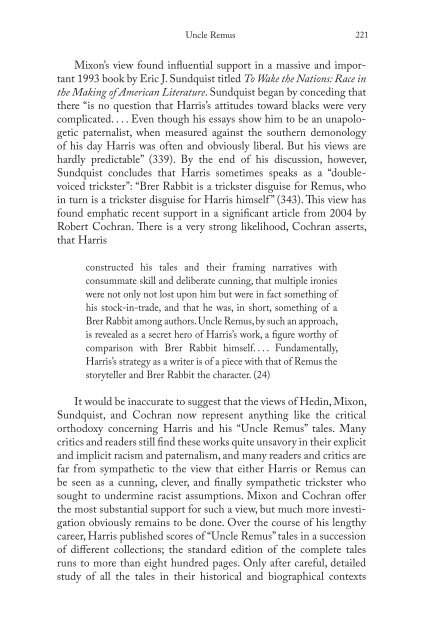Blooms Literary Themes - THE TRICKSTER.pdf - ymerleksi - home
Blooms Literary Themes - THE TRICKSTER.pdf - ymerleksi - home
Blooms Literary Themes - THE TRICKSTER.pdf - ymerleksi - home
Create successful ePaper yourself
Turn your PDF publications into a flip-book with our unique Google optimized e-Paper software.
Uncle Remus 221<br />
Mixon’s view found infl uential support in a massive and important<br />
1993 book by Eric J. Sundquist titled To Wake the Nations: Race in<br />
the Making of American Literature. Sundquist began by conceding that<br />
there “is no question that Harris’s attitudes toward blacks were very<br />
complicated. . . . Even though his essays show him to be an unapologetic<br />
paternalist, when measured against the southern demonology<br />
of his day Harris was often and obviously liberal. But his views are<br />
hardly predictable” (339). By the end of his discussion, however,<br />
Sundquist concludes that Harris sometimes speaks as a “doublevoiced<br />
trickster”: “Brer Rabbit is a trickster disguise for Remus, who<br />
in turn is a trickster disguise for Harris himself ” (343). Th is view has<br />
found emphatic recent support in a signifi cant article from 2004 by<br />
Robert Cochran. Th ere is a very strong likelihood, Cochran asserts,<br />
that Harris<br />
constructed his tales and their framing narratives with<br />
consummate skill and deliberate cunning, that multiple ironies<br />
were not only not lost upon him but were in fact something of<br />
his stock-in-trade, and that he was, in short, something of a<br />
Brer Rabbit among authors. Uncle Remus, by such an approach,<br />
is revealed as a secret hero of Harris’s work, a fi gure worthy of<br />
comparison with Brer Rabbit himself. . . . Fundamentally,<br />
Harris’s strategy as a writer is of a piece with that of Remus the<br />
storyteller and Brer Rabbit the character. (24)<br />
It would be inaccurate to suggest that the views of Hedin, Mixon,<br />
Sundquist, and Cochran now represent anything like the critical<br />
orthodoxy concerning Harris and his “Uncle Remus” tales. Many<br />
critics and readers still fi nd these works quite unsavory in their explicit<br />
and implicit racism and paternalism, and many readers and critics are<br />
far from sympathetic to the view that either Harris or Remus can<br />
be seen as a cunning, clever, and fi nally sympathetic trickster who<br />
sought to undermine racist assumptions. Mixon and Cochran off er<br />
the most substantial support for such a view, but much more investigation<br />
obviously remains to be done. Over the course of his lengthy<br />
career, Harris published scores of “Uncle Remus” tales in a succession<br />
of diff erent collections; the standard edition of the complete tales<br />
runs to more than eight hundred pages. Only after careful, detailed<br />
study of all the tales in their historical and biographical contexts

















